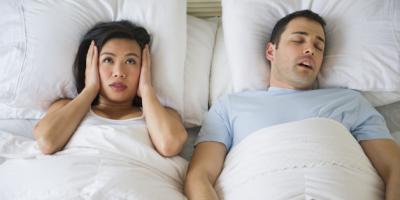
Ask yourself the following questions:
- Are you tired during the day, dozing off during a meeting, church or movie, while reading or watching TV, or when driving?
- Have you been told that you snore or have stopped breathing in your sleep?
- Do you wake gasping or choking during sleep?
- Do you have trouble staying asleep?
- Do you wake up unrefreshed as opposed to wakening wide-eyed and bushy-tailed?
- Do you wake with a dry mouth, throat irritation or morning headache?
- Are you increasingly irritable, forgetful, depressed or anxious?
- Have you been diagnosed with a hypertension, diabetes, thyroid disease, fibromyalgia, cardiac rhythm problem/atrial fibrillation, congestive heart failure, heart attack, stroke or early dementia?
If you answered yes to any of these questions, you may have obstructive sleep apnea.
What is sleep apnea?
Sleep apnea is a condition where your airway is blocked or partially blocked, causing interruptions in sleep, decreased oxygen to the heart and brain, and may contribute to the development of amyloid plaques in the brain. Amyloid plaques have been found in brains of individuals with Alzheimer-type dementia as well as other neurodegenerative disorders. Left untreated, obstructive sleep apnea may lead to poor quality of life, contribute to diseases and even have dire consequences for your health, including hastening death.
Individuals with chronic pain are often are treated with opiates (e.g., tramadol, hydrocodone, oxycodone or morphine); individuals with anxiety are often treated with benzodiazepines (e.g., alprazolam or clonazepam). These medications decrease the breathing drive and may lead to central sleep apnea.
Some individuals may have a combination of obstructive and central sleep apnea, called complex sleep apnea. Other individuals, especially those who have heart failure, may have cycles of slowing down followed by speeding up in their breathing, which is known as periodic breathing.
How is sleep apnea diagnosed?
Sleep apnea is diagnosed with an overnight sleep study. These can be done at home or in a sleep center. A center study is preferred because the monitoring can differentiate between the different types of sleep disorders.
A center sleep study consists of:
- Electodes that are placed around the head to determine stages of sleep and around your eyes, nose and mouth (not to worry, no needles!) to measure breathing, mouth movements, and dream status
- EKG (heart) monitor placed on your chest to monitor for abnormal heart rhythms,
- Pulse oximetry to check for drops your oxygen levels,
- Elastic bands around the chest and abdomen to determine when you are breathing, and finally
- Electodes on the legs to monitor for leg movements
All of these connected wires which are bunched into a single connector that may be easily disconnected should you need to use the bathroom during the night. Home studies are an option, but due to the fewer things being monitored are unable to tell the difference between obstructive, central or complex sleep apnea. Home studies are also unable to identify other sleep disorders, such as periodic limb movements of sleep, nighttime teeth grinding (bruxism) or parasomnias (sleep talking, sleep walking, confusional arousals or REM sleep behavior disorder).
How is sleep apnea treated?
Fortunately, sleep apnea can be easily treated. The most effective and most preferred method of treatment is positive airway pressure (CPAP or bilevel PAP) therapy. This therapy consists of a mask that comfortably fits around the individual’s nose and/or mouth, providing the minimum air pressure necessary to keep the airway open, allowing air to reach the lungs and ultimately provide oxygen to the heart and brain. For those who do not tolerate positive airway pressure therapy, there are alternatives, such has oral appliances that keeps the tongue and jaw forward; or surgical procedures, such implants to support the palate, uvulopalatopharygoplasty (UPPP) or electrical stimulators to keep the tongue from falling back and blocking the back of the throat.
How can you get evaluated?
If you think that you, your spouse, family member or friend may have sleep apnea, talk to your primary care physician, who can refer you to SIMED Sleep Center for a formal sleep evaluation. If your insurance does not require a referral and you would like to set up an appointment, you can call SIMED Sleep Center directly at (352) 224-2388 to set up your sleep evaluation.